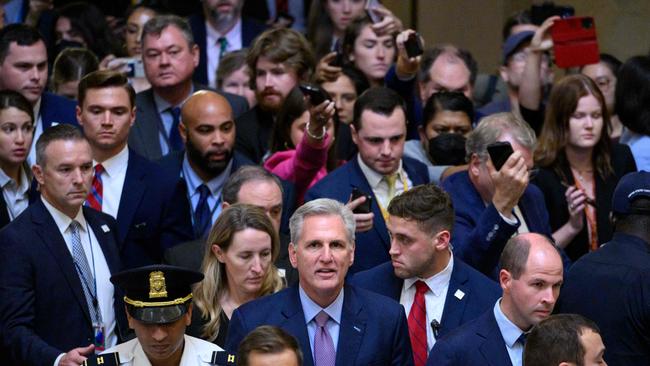
McCarthy, who won the Speaker’s gavel back in January after a marathon series of votes, was an effective speaker in a finely balanced chamber, which had been left with 221 Republicans and 212 Democrats after close midterm elections last November.
He averted a US government default in June, and a government shutdown only days ago, through a series of compromises that maintained majority support of Republicans with enough Democrats in tow. Whatever his alleged philosophical shortcomings, according to some in the GOP, he was a highly articulate media performer.
Without knowing who is going to replace him, it’s hard to say what the defenestration means for Congress, the standing of the two major parties, or the dynamics of the US presidential election. Even Donald Trump, not known for his reticence, has said nothing since McCarthy was voted out.
“Why is it that Republicans are always fighting among themselves, why aren’t they fighting the Radical Left Democrats who are destroying our Country?” he posted on social media before the vote took place.

One thing is sure, Congress’s approval rating with the American public, famously low around 20 per cent, or half that of Joe Biden, isn’t likely to improve as a result.
And so is another: McCarthy said he won’t be running for Speaker again in a late night press conference — and hence any leadership position in the congress.
The vast bulk of Republicans supported McCarthy, but a group of eight so-called ‘hardline’ Republicans – “attention seeking” might be a better term – led by Matt Gaetz, a young, ambitious Florida congressman, voted to remove the California Republican on Tuesday (Wednesday AEST).
Most of the eight argued McCarthy didn’t do enough to cut spending, apparently forgetting the Democratic Party controls both the White House and the Senate for the foreseeable future, two institutions that have to agree to any spending cuts.
His fate appeared to be sealed after Nancy Mace of South Carolina, a moderate who has worked well with McCarthy in the past, surprisingly voted to oust him.
“Bring it on,” the now former speaker, for months aware of his vulnerability, posted on social media a day earlier, expressing, as it turned out, quite misplaced confidence, becoming among the shortest serving speaker in US history.
A handful of Democrats could have saved him, and doubtless many would prefer to avoid the procedural drama that will now consume the lower house for days, or perhaps weeks. Indeed, the business of the House, which includes trying to make the AUKUS security pact operational, cannot continue until a speaker is selected.

But ultimately Democrats decided to vote for GOP turmoil and recrimination, resulting in a final vote of 216 votes to 210 to remove McCarthy. They saw a political opportunity in stoking division within the GOP, and presenting themselves as the party of maturity in contrast to Republicans who they will argue, are in thrall to Donald Trump and keen to “wreck the joint”.
What happened to McCarthy was historic. Never before has a Speaker been ejected by Congress in this manner. In fact, it was only because of reforms that he introduced back in January – to empower individual members to bring spill motions – that it was able to occur at all.
The last time a speaker faced a motion to vacate was in 1910, but then, Republican Joseph Cannon ultimately prevailed.

The speakership matters much more in the US than in Australia, where it’s almost always a bauble awarded by the government of the day. He or she decides bills that get voted on, and the composition of the powerful committees that that produce legislation, not to mention holds perhaps the second most powerful political megaphone in the nation.
The ragtag group of Republicans that defenestrated their leader must be feeling pretty chuffed by their achievement, especially Congressman Matt Gaetz, 41, who garnered an extraordinary level of media attention, casting himself as the man of principle and change.
Gaetz reportedly fancies himself as the successor to Florida Governor Ron DeSantis, given the incumbent’s term-limited time in office must end in 2026.
“We’ve ripped off the band aid,” he claimed outside the Capitol after his victory, knowing that the underlying wound was set to become a festering sore.







The historic and unexpected ouster of Republican House of Representatives Speaker Kevin McCarthy has plunged America’s parliament into chaos, leaving vacant a critical position in the US government, first in line to the presidency after the vice-president.